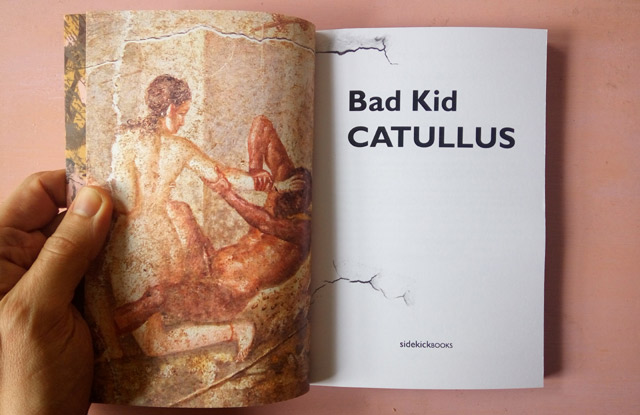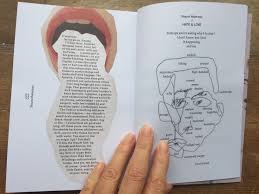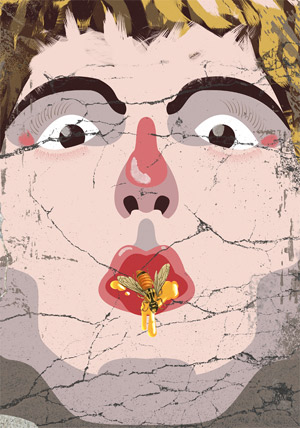
Sidekick Books is run by Jon Stone and Kirsten Irving, and operates out of East Dulwich, London.
Related Posts
A recent hybrid release called Bad Kid Catullus muses on and ushers in new voices for the dead poet from Ancient Rome. As the copy states “In this interactive handbook, his famously sexy, savage, tender and scurrilous poems have been transformed and mutated in myriad ways: compressed, expanded, bricolaged, Catullus in six pulp genres, Catullus as playlist — even a Catullus kama sutra. And then there are pages for you, the reader, to fill in, in your own obscene fashion.”
When did you get the idea to put together an anthology of Catullus covers?
Kirsten Irving: We’ve been interested in the idea of alternative translations for a while, and when we were planning the Headbooks series (most of which address themes, rather than individuals), Catullus seemed like the perfect big personality to carry off a solo book. We wanted to play with the idea of recovered fragments and alternative readings, transplanting Catullus forward and backward in time and across worlds.
Jon Stone: I’d also add that years and years ago, I planned on doing an entire book of my own science-fiction translations of Catullus. I finished a few of them and published a couple (one is in the 2009 anthology City State: New London Poetry, another in the 2012 science-fiction poetry anthology When Rockets Burn Through, both published by Penned In The Margins). Over the years, we encountered various other inventive reworkings of the same poems, so the idea gradually shifted from being a solo project to a collaborative one. For a while, we were going to collect together existing versions in a compendium, but once we’d decided on the Headbooks format we switched over to commissioning new versions instead.

Catullus has a long history in the UK with so many great poets imitating his work over the years. Did you feel a sense you were doing something both time-honored and unique?
Kirsten: We definitely drew on what had gone before, using existing translations as kick-off points for new ways of looking at the poems. This was practical in part: we don’t speak much Latin! One version of Catullus XVI, for example, sees Jon collate translations of the line “I will sodomize and face-fuck you” to form a collage poem in itself.
Jon: The very fact that Catullus has been translated so often and in so many different ways is what provided the impetus for the book. It’s like the clay has been kneaded and softened by successive hands — the poems are made more malleable through constant reworking over centuries. And when you’re able to see multiple translations alongside one another, in conversation with one another, you get a real feel for language as living matter, as ripe for intervention.
How did you find so many Catullus “kids” out there?
Kirsten: We weren’t sure how many we would find when we put out the call, but it seems there are a lot of Catullus fans out there! I think he appeals because he’s relateable. His work feels fresh, rude, bitchy, accomplished, and passionate, and I think even those with little time for the classics get a kick out of his work.
Jon: You’ve got a fairly good chance as well that people will do their research in order to submit something to a project, if it excites them. We pushed the “visual poem” aspect quite hard in our call for submissions, so some poets will have become converts in the process of rustling up a proposal for us.
How did the idea of having the book so interactive come about?
Related Posts
Kirsten: All of our books have a collaborative element in them, but the Headbooks series, of which BKC is number 2, puts interactivity front and center. We wanted to invite the reader to become one of the book’s authors. While there is poetry in these titles, we see each book more as a guidebook or handbook to each subject. We’ve been working with prompts, challenges and commissions since our inception as a press, and it’s great to be able to bring these together in these anthologies.
Jon: Also, the raison d’etre of Sidekick is pretty much to mix elements of different things, to make books that are somewhere in between conventional categories. Previously we’ve mixed poetry and essays, poetry and science, poetry and ornithopedia, and so on. The Headbooks series is intended to be part creative activity book, part compendium, part handheld exhibition. The interactive element — well, that draws out something that’s inherent in poetry. All literature asks the reader to make sense of it, to bring something of themselves to it, and poetry especially so — you work at a poem and you play with it, in order to enjoy it. The next stage is to ask the reader to physically write in or add something, right onto the page.

I love the warning signs ad-libbing lines of Catullus poetry. How hard was it to come up with so many visuals for this book?
Kirsten: When we put out the original call, we asked specifically for visual or typographically interesting work. This opened things up for visual poets to get involved, and encouraged other poets to play experiment and try new styles; that energy really comes through in the final book. We’re aware that not everybody has access to Photoshop or the training to use it, so we either scanned in analogue work or helped with laying out the concept at our end, with guidance from the author.
Jon: My answer would be: it was very hard, and I wish we’d had more time to come up with more! As is often the case, we had a great many vague notions of how the visuals would work, but when we tried to focus in on one idea more closely, it would resist being actualized, or you would have to ask: “But why this form? Does that add anything, or would it just be confusing?” We had to dump the idea of comic strips because it was too much work, and the poems resolved themselves almost too easily into a narratively boring series of events. Fortunately, many of the contributors rose to the challenge of creating visual interpretations beyond those we had envisaged.
What has the reception been like for Bad Kid Catullus?
Kirsten: We’ve had a great response from individual buyers, bookshops and contributors. The Poetry Society invited us to host a Headbooks exhibition in Covent Garden, in which art from Bad Kid Catullus was displayed upstairs, while below deck, visitors could see art from our underwater Headbook, Aquanauts. Catullus is a familiar name, and I think people appreciate that we’re trying to take his work in a new direction and introduce him to new audiences.
Jon: Very positive response from those who are already familiar with Catullus. Slightly trickier, as ever, to lure in people who don’t normally go for poetry, but we’ve managed to tempt a few with the aid of our “Parental Advisory: Explicit Lyrics” stickers, which we’ve been sticking on the covers of bookshop copies.
Related Posts